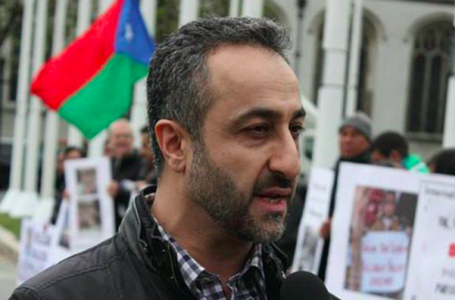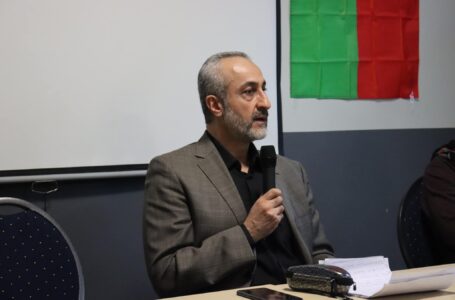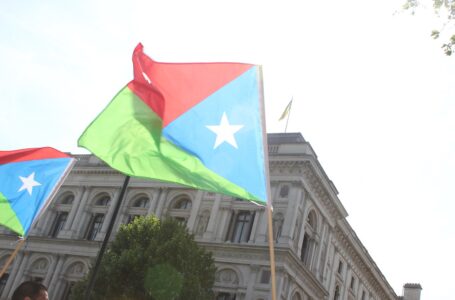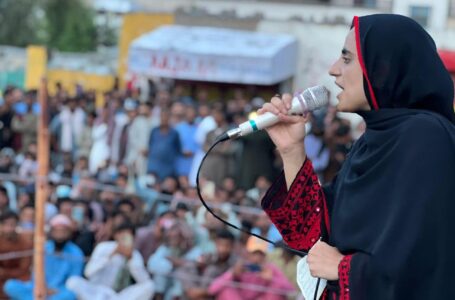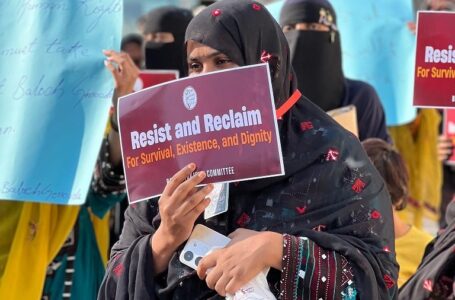FBM Holds Simultaneous Protests Against Pakistan’s Nuclear Tests on Baloch Land
Freedom of Balochistan fundamental to regional peace
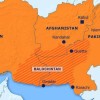
The Baloch are India’s natural allies. A strong and liberal Baloch movement is a deterrent against Pakistan to carry out terrorist activities in Afghanistan and India.
In 1839 when the British forces attacked Balochistan, the Baloch ruler Khan Mehrab Khan, instead of accepting the occupation of the British, resisted the foreign forces. He along with many of his other companions were killed during this resistance and became immortal in Baloch history. After the invasion, the British drew the Goldsmid Line and the Durand Line, dividing Balochistan into three parts. The western part was given to Iran, one chunk of Balochistan was brought under Afghanistan’s administration, but the eastern part of Balochistan (currently occupied by Pakistan) remained with the British, as a semi-autonomous region.
The Baloch continued their unconventional resistance against the British forces until the British eventually conceded defeat and decided to leave the sub-continent and recognise the sovereignty of Balochistan. The then Baloch ruler declared independence on 11 August 1947 and Balochistan remained independent for 252 days and had its own Upper and Lower Houses—House of Commons and House of Lords. Pakistan first tried to trick Balochistan into joining the renegade part of India in the name of religion, but when both Houses of Balochistan unanimously refused to become a part of Pakistan, Pakistan’s Punjabi army attacked the Baloch country and forcibly occupied it on 27 March 1948.
The main reason for occupying Balochistan was because of its natural resources. Landlocked Punjab knew it could not survive without Balochistan’s natural wealth. The so-called pioneer of Pakistan, Mr Jinnah was well aware of Balochistan’s natural resources and strategic importance because he had worked for the ruler of Balochistan as his lawyer.
Balochistan’s strategic location is very important as it acts as a link between three regions—Central Asia, the Middle East and South Asia. In addition, the port of Gwadar is situated near the Strait of Hormuz, which is a choke-point through which 20% of the world’s oil trade passes. In the 21st century, ports play an essential role from the defence point of view for any country. Pakistan without Balochistan and the Sindh Sea is landlocked like Kazakhstan, Tajikistan, Uzbekistan and Afghanistan are. That is why Pakistan is collaborating with China to loot Baloch resources and is gaining suzerainty of the Baloch land and sea in order to monitor the Arabian and Indian Oceans.
The emerging superpower of the world, China, is attempting to secure a foothold at most important strategic points and ports in order to better control the world economy. Therefore, China, in partnership with Pakistan, is building the Jiwani naval base in Gwadar to establish its long term presence in the seas in the region and is also setting up a military base in Balochistan as a means of encircling India and throwing out the United States from the region in the future. China and Pakistan are exploiting Baloch national resources such as gold and copper and are attempting to marginalise the Baloch people by settling 50,000 Chinese in Gwadar and another 200 million Chinese and Punjabis in Balochistan.
The Baloch people have been struggling since 1948 against Pakistani occupation. The Baloch fought in 1948, 1958, 1962 and 1974 against Pakistan. However, in 1996, Baloch leader Hyrbyair Marri, after re-evaluating the weaknesses and failures of past attempts at Baloch freedom, laid the foundation of the current phase of the Baloch liberation movement, which took practical shape in 2000, unequivocally demanding independence and unconditional withdrawal of Pakistani occupation forces from Balochistan.
Soon, the Baloch freedom movement spread all over Balochistan and people from all walks of life joined in. The success and popularity of the Baloch freedom movement among Baloch masses have become a huge problem for Pakistan. Initially, Pakistan attempted to suppress the movement, but it failed. Many intellectuals and observers were of the view that this was the first Balochistan-wide Baloch movement based on scientific methods.
What is more frustrating for Pakistan is that it failed to defeat the Baloch liberation struggle despite killing thousands of Baloch and forcibly disappearing more than 20,000, and dumping decomposed, tortured and bullet-ridden dead bodies of thousands of Baloch political prisoners. The brutal torture of state forces includes gouging the eyes of the victims, cutting their tongues, noses, amputating their limbs, drilling holes in their bodies and many other inhuman and brutal mediums of torture.
A strong and liberal Baloch movement is a deterrent against Pakistan to carry out terrorist activities in Afghanistan and India. Before the start of the ongoing Baloch movement, Pakistan was wholeheartedly supporting the “Kashmir movement”. The “Kashmir movement” was very strong between 1987 and 1999. Pakistan radicalised Baloch youths from all across Balochistan and sent them to Kashmir. They mainly recruited people from Kalat, Mastung, Zamran and Panjgoor for ISI backed religious groups and sent them to Kashmir and Afghanistan for jihad. Many Baloch youths were killed in Afghanistan and Kashmir and their dead bodies were sent back to their villages in Balochistan.
When the Baloch liberation struggle was strong, Pakistan did not have time even to think about Kashmir because it considered the Baloch struggle to be a greater threat. Also, Pakistan was scared that neighbouring countries might raise the issue of human rights violations in Balochistan and put international pressure on Pakistan. That is why Pakistan sidelined the Kashmir issue and focused completely on the Balochistan conflict.
Prime Minister Narendra Modi publicly committed to supporting the Baloch cause diplomatically, but he could not fulfil his commitment. The Afghan government too could not fully support the Baloch. But on the other hand, despite American, NATO and international pressure, Pakistan supported the Taliban and continued giving shelter to them because it knew that the shape of war had changed.
These modern hybrid wars cannot be won only with jets, aeroplanes and atom bombs. Instead, it can be won with the support of non-state actors. The American military could not win the Iraq, Syria and Afghanistan wars, but those were won by Iran and Pakistan by using non-state actors and proxies. Similarly, Russia, with all its sophisticated weapons could not win the war in Afghanistan, which Pakistan, Saudi Arabia and the US won with the help of non-state actors at the time.
India, as a staunch regional supporter of the Afghan government, could not apprehend that they needed strong allies. The Baloch are the natural allies and friends of India because both are facing the same enemy. The Baloch movement remained a deterrent against Pakistan for 17 years which obviously benefited India as well because when the Baloch movement was strong Pakistan didn’t have the time and resources to support Kashmir.
The Baloch national leader, Hyrbyair Marri, describes Pakistan as a “master of deception”, which exploited India’s weaknesses and started organising the “Kashmir movement” clandestinely. Pakistan, took billions of dollars from the US for defeating the terrorist Taliban, but used those funds for supporting the Taliban, and gave them sanctuary and funded them for defeating the US in Afghanistan. How could one expect Pakistan to be honest with India whom it considers to be an archrival?
So, Pakistan again rejuvenated the “Kashmir movement” and is attempting to overshadow the Balochistan independence movement with the “Kashmir movement”. Once again in Balochistan, Hafiz Saeed, ISI and Kashmiri leaders have become active to divert the Baloch people’s attention from Balochistan to Kashmir.
Security workshops were held in Quetta where Kashmiri leaders attempted to brainwash the Baloch people to distract them from the Baloch movement and attract them towards jihad in Kashmir. Also, the UN designated terrorist Hafiz Saeed made several visits to Balochistan under the patronage of the ISI. He organised meetings in Panjgoor, Zamran, Kalat and Mastung.
If the US had fought the war against terrorism in Pakistan they would have defeated the terrorists and terrorism, but instead of fighting the Taliban in Pakistan, the US fought the ghosts in Afghanistan. If the US forces killed 10 Taliban members, the Pakistan military would recruit another 20 from their sanctuary and training centre to wreak havoc in Afghanistan. Pakistan fought its war in Afghanistan against the US through proxies in a similar fashion to which it has been using the Kashmiri non-state actors against India. If India kills 10 in Kashmir, Pakistan will recruit another 20 and ask them to fight Pakistan’s war on Indian soil.
Neither the US with the help of NATO could defeat the ghost warfare in Afghanistan, nor can India. They cannot win until Pakistan is treated with the same medicine, which it has been using against the US in Afghanistan and India. The Baloch are natural allies of the Indian and Afghan people in the region, which is why the independence of Balochistan is the ultimate solution and a long lasting remedy for regional peace. A free and secular Baloch state can guarantee peace and development of the region.
Beebagr Baloch is a member of Free Balochistan Movement and lives in Germany. He tweets at @Beebagr_Baloch


